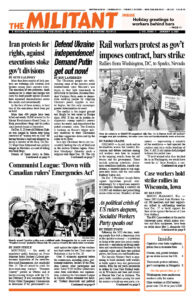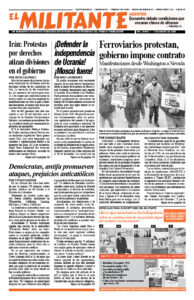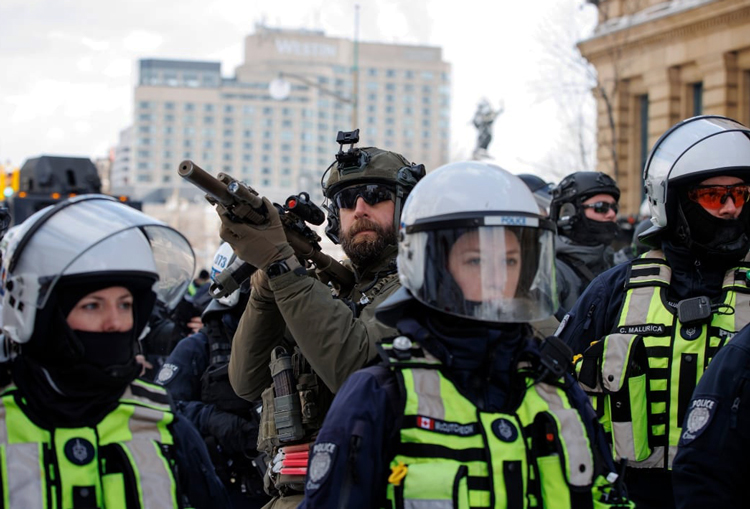MONTREAL — Six weeks of mandatory public hearings on Prime Minister Justin Trudeau’s Liberal government imposition of the never-before-used Emergencies Act concluded Nov. 25. The act aimed to crush the three-week-long truckers’ “Freedom Convoy” protest in Ottawa and at border-crossing bridges with the U.S. last February. It was convened by the Public Order Emergency Commission to determine if the government’s assault against the rights of the truckers was legal under the law. Their report to Parliament is due by Feb. 20.
Over 75 witnesses appeared before the commission, including police, government ministers, leaders of the Freedom Convoy, other participants and more. Some 9,500 written submissions came from individuals and organizations, including the Communist League in Canada, whose statement was headed: “Defend democratic and political rights! Repeal the Emergencies Act!” The last person to testify was Trudeau, who defended his government’s attack on the truckers and on political rights.

The truckers’ actions clogged Ottawa streets around Parliament Hill with semis, vans and cars 24/7 along with daily protests. Their aim was to press the government to end federal anti-COVID government vaccine mandates that threatened their jobs and livelihoods, along with other government policies they disagreed with.
To win support for his decision to invoke the Emergencies Act, voiding basic political rights, Trudeau waged a slander campaign against the truckers, who he falsely smeared as “white supremacist, swastika-waving, war memorial desecrators.”
After imposing the act Feb. 14, Ottawa unleashed “one of the largest acts of police repression in modern Canadian history,” the Communist League wrote to the Public Order Emergency Commission. Over 200 were arrested, including the Freedom Convoy’s main organizers, who still face criminal charges.
In his testimony, army veteran Chris Deering told the commission that he felt it was his duty to participate in the protest. As a policeman arrested him, “he kneed me in my side and kicked me in my back,” Deering said. “I had my hands completely up. I’m saying, ‘I’m peaceful. I’m peaceful. I’m not resisting.’”
Tamara Lich, one of the most prominent spokespersons for the Freedom Convoy, and a leader of the Alberta separatist Maverick Party, spent a total of 49 days in jail after being arrested without having been tried or convicted. As a result of onerous bail conditions, she said, “My trial is not till next year and I have to live under these conditions.”
Lich is forbidden from using social media for any reason, contacting any of the other leaders of the convoy, or doing anything in connection with movements opposing vaccine mandates, among other restrictions.
The Communist League calls for dropping all charges against Lich and other convoy leaders and participants. “The continued violation of their rights by Ottawa, police and the courts constitute a threat to the democratic and political rights of all,” it said.
In their testimony, Trudeau and other government officials argued that using the Emergencies Act was legally justified because they considered it a “national public order emergency.”
Trudeau claimed there was a “potential” for violence in the convoy, though he admitted no “serious violence” took place.
Trudeau argued that the Ottawa protest was illegitimate. “It wasn’t that [protesters] just wanted to be heard,” he said. “They wanted us to change public health policy.” Such arguments could be used against anyone protesting government policies.
He said smugly he was “absolutely serene and confident that I made the right choice.”
Capitalist rulers target workers
Deputy Prime Minister Chrystia Freeland told the commission that she had met with the CEOs of Canada’s key banks who convinced her the convoy was “profoundly jeopardizing” the country’s economy. She claimed this “threat to economic security” endangered “national security,” a rationale for using the Emergencies Act.
Much of the debate before the commission was focused on whether the protest met the “threshold” for invoking the act’s draconian restrictions on basic rights. The Communist League explained the entire law, as well as “the premise of the commission,” should be thrown out.
A poll taken following the end of the hearings showed a majority opposed the use of the Emergencies Act against the truckers. Many said they had originally supported Trudeau’s action, but changed their minds after seeing some of the live-streamed hearings.
A dramatic example of the growing use of anti-working-class legislation took place during the hearings when the Ontario Provincial Government of Premier Douglas Ford invoked one of the most draconian anti-labor laws in years, Bill 28, in an effort to crush the November strike by 55,000 school support workers, member of the Canadian Union of Public Employees. The workers defied the law and with the support of the labor movement nationwide forced Ford to repeal the law.
After the Emergencies Act was used the 180,000-member Ontario Public Employees Union pointed to the way such laws could be utilized against workers in a Feb. 17 statement. “Historically the labor movement has often been the target of legislation aimed at suppressing anti-government dissent, including times when workers have demanded better living conditions through strike actions.”
“The OPSEU statement got it right. In the context of the deepening economic, social, and political crisis of the capitalist system, the use of the Emergencies Act against the truckers was a calculated precedent-setting pre-emptive blow against rising working-class resistance and the use of union power to defend our interests,” Beverly Bernardo, Communist League candidate in the upcoming Quebec by-election in the Montreal Saint Henri-Sainte Anne constituency, told the Militant.
“Strikebreaking laws are being used more and more by the billionaire ruling-class families. In South Korea truck drivers were recently forced to defy back-to-work legislation, and in the U.S., Democrats and Republicans in Congress united to pass a law banning a Dec. 9 strike by rail workers, forcing them to accept contract terms the majority had voted against.
“OPSEU’s warning should be taken to heart by the entire union movement and all fighting workers,” said Bernardo. “The Emergencies Act is aimed squarely at the working class as a whole and our unions.”


